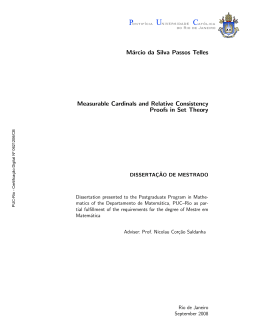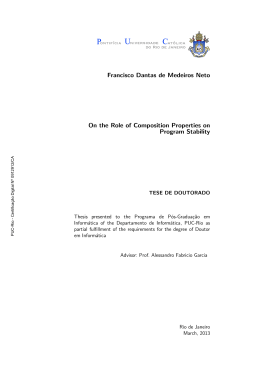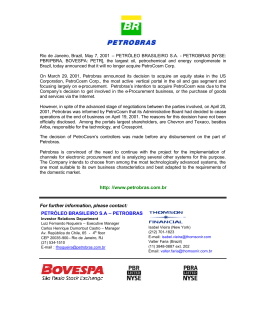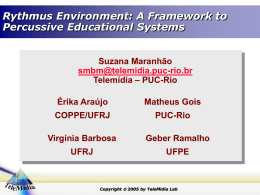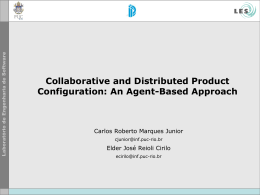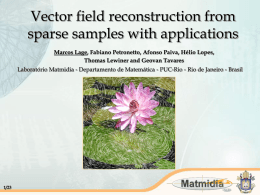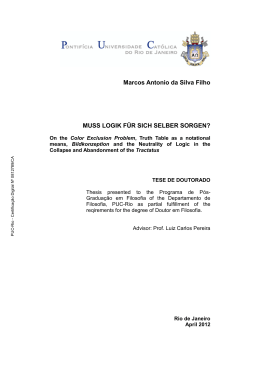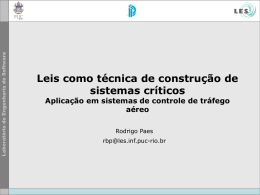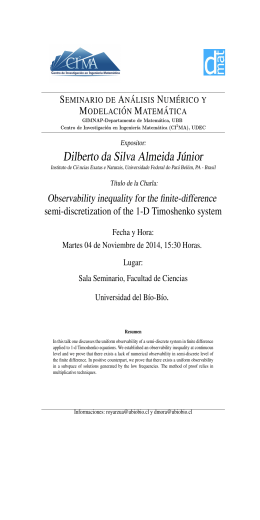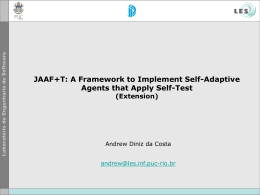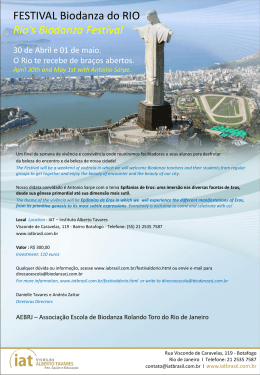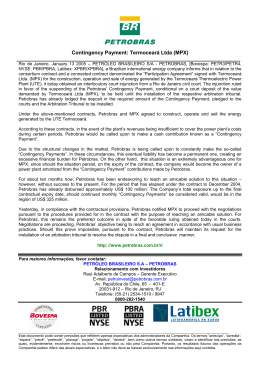PUC-Rio - Certificação Digital Nº 0611954/CA Roger Rocha Petroleum Supply Planning: Models, Reformulations and Algorithms TESE DE DOUTORADO DEPARTMENTO DE INFORMÁTICA Postgraduate program in Informatics Rio de Janeiro May 2010 Roger Rocha PUC-Rio - Certificação Digital Nº 0611954/CA Petroleum Supply Planning: Models, Reformulations and Algorithms Tese de Doutorado Thesis presented to the Postgraduate Program in Informatics of the Departmento de Informática, PUC–Rio as partial fulfillment of the requirements for the degree of Doutor em Informática Advisor: Prof. Marcus Vinicius Soledade Poggi de Aragão Rio de Janeiro May 2010 Roger Rocha Petroleum Supply Planning: Models, Reformulations and Algorithms PUC-Rio - Certificação Digital Nº 0611954/CA Thesis presented to the Postgraduate Program in Informatics of the Departmento de Informática do Centro Técnico Cientı́fico da PUC– Rio, as partial fulfillment of the requirements for the degree of Doutor. Approved by the following commission: Prof. Marcus Vinicius Soledade Poggi de Aragão Advisor Departmento de Informática — PUC–Rio Prof. Ruy Luiz Milidiú Departamento de Informática — PUC–Rio Prof. Silvio Hamacher Departamento de Engenharia Industrial — PUC–Rio Prof. Abilio Pereira de Lucena Filho Departamento de Administração — UFRJ Prof. Eduardo Uchoa Barboza Departamento de Engenharia de Produção — UFF Prof. Marcia Helena Costa Fampa Departamento de Ciência da Computação — UFRJ Prof. José Eugenio Leal Coordinator of the Centro Técnico Cientı́fico da PUC–Rio Rio de Janeiro, May 24, 2010 All rights reserved. Roger Rocha PUC-Rio - Certificação Digital Nº 0611954/CA Graduated from the Universidade Federal do Espı́rito Santo in Mechanical Engineering. He did part of his undergraduate studies at Ècole de Mines de Nancy (France) in the Decision Support and Production System Department. He then specialized at PETROBRAS University in Equipment Engineering - Petroleum Refining and Production Systems. He obtained a Master degree at COPPE-UFRJ in Computer Science and System Engineering. He has been working at PETROBRAS Research and Development Center since 2001 where he develops decision support tools for the business areas. Bibliographic data Rocha, Roger Petroleum Supply Planning: Models, Reformulations and Algorithms / Roger Rocha; advisor: Marcus Vinicius Soledade Poggi de Aragão. — 2010. 124 f: il.; 29,7 cm 1. Tese (Doutorado em Informática - Pontifı́cia Universidade Católica do Rio de Janeiro, Departmento de Informática, 2010. Inclui bibliografia. 1. Informática – Teses. 2. Planejamento do Suprimento de Petróleo. 3. Programação Inteira. 4. Algoritmo de Decomposição. 5. Programação Disjuntiva. 6. Reformulações. I. Poggi de Aragão, Marcus V.S.. II. Pontifı́cia Universidade Católica do Rio de Janeiro. Departmento de Informática. III. Tı́tulo. CDD: 004 PUC-Rio - Certificação Digital Nº 0611954/CA To my wife Renata, my father Jarbas and my mother Helena PUC-Rio - Certificação Digital Nº 0611954/CA Acknowledgments I would like to express my gratitude to my advisor Professor Marcus Vinicius Soledade Poggi de Aragão for his continuous support, advice and incentive during my research. His invaluable guidance was essential in all the time of research and writing of this thesis. It is an honor for me having worked with Prof. Ignacio Grossmann at Carnegie Mellon University. My sincere thanks goes to him for accepting me as a visiting student and providing me excellent insights on mathematical modeling and solution techniques. Most of the chapters of this thesis are joint work with him. I owe my deepest gratitude to PETROBRAS, for giving me the opportunity and time to carry over this research and allowing me to add this achievement to my career. In particular, I am grateful to my manager, Luiz Fernando de Jesus Bernardo, for his motivation, enthusiasm and friendship that always helped me to keep on working during hard times. I also want to thank all my friends at the Logistic, Distribution and Transportation Department at PETROBRAS Research Center. They kept the ball rolling during the time I was out working for my thesis. Last, but not least, I would like to show my gratitude to all fellows in my church for the spiritual support, specially during the time I was expatriated. Resumo PUC-Rio - Certificação Digital Nº 0611954/CA Rocha, Roger; Poggi de Aragão, Marcus V.S.. Planejamento do Suprimento de Petróleo: Modelos, Reformulações e Algoritmos . Rio de Janeiro, 2010. 124p. Tese de Doutorado — Departamento de Informática, Pontifı́cia Universidade Católica do Rio de Janeiro. A atividade de Planejamento de Suprimento de Petróleo é um elo importante para a integração da Cadeia de Suprimento de Petróleo na PETROBRAS, uma vez que é responsável por refinar as informações do planejamento estratégico a ser implementado no nı́vel operacional. Nesta tese, esse problema é definido e explicado em detalhes e um modelo de programação Inteira Mista é proposto para resolvê-lo. Embora os resolvedores de problemas de programação Inteira Mista tenham evoluı́do de forma surpreendente na última década, para esta aplicação em particular, com o modelo inicial proposto não é possı́vel obter soluções com qualidade satisfatória em tempo computacional aceitável. Desta forma, a linha de pesquisa desta tese consistiu em investigar, em detalhe, a estrutura deste problema a fim de encontrar reformulações mais adequadas e novos algoritmos para a solução deste problema. O foco principal desta tese é resolver de forma eficiente o problema de planejamento de suprimento de petróleo na PETROBRAS, no entanto, como subprodutos desse esforço são propostos um novo algoritmo de decomposição e reformulações que podem ser aplicados a uma ampla gama de problemas. No que diz respeito à realização do objetivo principal, todos os casos testados foram resolvidos de maneira eficiente através dos desenvolvimentos propostos. O novo algoritmo de decomposição se mostrou o método mais adequado para resolver as instâncias com mais de duas classes de navios operando em cada plataforma. Já para os casos com uma ou duas classes de navios, a formulação denominada Hull Relaxation, que tem como base uma estrutura definida neste trabalho como Cascading Knapsack Inequalities, é a melhor alternativa de solução. Tendo em vista estas alternativas de soluções, é implementado um algoritmo geral que automaticamente escolhe a melhor opção de solução, em função da estrutura do problema. Para a situação onde o número de classes de navios operando nas diversas plataformas varia entre um e quatro, pode-se usar mais de uma abordagem em paralelo e considerar como solução a alternativa mais rápida ou com melhor resultado. Este modelo está sendo testado na PETROBRAS e tem-se mostrado uma ferramenta eficaz para a integração de sua cadeia de suprimentos de petróleo, bem como permitindo a análise de cenários para a obtenção de soluções alternativas até então não exploradas. Palavras-chave PUC-Rio - Certificação Digital Nº 0611954/CA Planejamento do Suprimento de Petróleo; Programação Inteira; Algoritmo de Decomposição; Programação Disjuntiva; Reformulações. Abstract PUC-Rio - Certificação Digital Nº 0611954/CA Rocha, Roger; Poggi de Aragão, Marcus V.S.. Petroleum Supply Planning: Models, Reformulations and Algorithms. Rio de Janeiro, 2010. 124p. DSc Thesis — Departamento de Informática, Pontifı́cia Universidade Católica do Rio de Janeiro. The Petroleum Supply Planning activity is an important link for the integration of the Petroleum Supply Chain at PETROBRAS as it is responsible for refining the strategic supply planning information to be used at the operational level. In this thesis we set the ground for understanding this important problem and we propose a mathematical model to solve it. Although the solvers in the last decade have evolved enormously, for this particular application we cannot get solutions with satisfactory quality in reasonable computational time with only the initial proposed model. This directed the line of research of this thesis into investigating, in detail, the structure of this problem in order to find more suitable reformulations and algorithms to tackle it. Our primary goal is to solve efficiently the petroleum supply planning problem at PETROBRAS. Nevertheless as a by-product of this endeavor, we propose a novel decomposition algorithm and reformulations based on a cascading knapsack structures that turn out to be applicable in a wide range of problems. Concerning the achievement of the main objective, we obtain good results for all instances we tested. We show that the novel decomposition algorithm is the most fitted method to solve the petroleum supply planning problem if we consider more than two tankers to offload each platform. In the case of one or two tankers to offload each platform, the hull relaxation formulation based on the cascading knapsack structure introduced after an inventory reformulation at platforms is the best option if one is to solve this problem. For the real application, these solution alternatives allow to implement a general algorithm that automatically switches to the best solution option depending on the structure of the problem. For the mixed situation, i.e., number of tanker varying from one to four, one can use more than one approaches in parallel and take the fastest or the best result obtained. This model is being tested at PETROBRAS and is showing to be an effective tool to help integrate its petroleum supply chain as well as to do what-if analysis to look for alternative solutions never thought before. Keywords Petroleum Supply Planning; Integer Programming; Decomposition Algorithm; Disjunctive Programming; Reformulations. PUC-Rio - Certificação Digital Nº 0611954/CA Contents 1 Introduction 1.1 Thesis Organization 14 16 2 Problem Description 2.1 Production Sites 2.2 Tanker Fleet 2.3 Petroleum Category 2.4 Maritime Terminals 2.5 Pipelines 2.6 Refineries 2.7 Problem Statement 18 19 20 20 21 22 22 22 3 Mathematical Model 3.1 Solution Example 3.2 Flexibility of Campaigns 3.3 Changeover Cut 24 31 33 36 4 Decomposition Algorithms 4.1 Summary 4.2 Dantzig and Wolfe Decomposition Column Generation 4.3 Benders Decomposition 4.4 Lagrangean Relaxation Lagrangean Decomposition 39 39 40 41 44 48 50 5 A Novel Decomposition Algorithm 5.1 Summary 5.2 The Basic Idea Cut Generation Separation problem Normalization Upshot of the algorithm 5.3 Improved Idea Local Branching Repairing MIP infeasibility 5.4 Computational Experiments Generalized Assignment problem Parallel Machine Scheduling problem 5.5 Conclusions 52 52 53 54 55 56 57 58 59 62 64 64 66 71 6 6.1 6.2 6.3 6.4 6.5 PUC-Rio - Certificação Digital Nº 0611954/CA 6.6 Cascading Knapsack Inequalities: Hidden Structure in some Inventory-Production-Distribution Problems Summary Introduction Initial Mathematical Formulation Inventory balance Reformulation Simplified Case: Only one class of tanker Two classes of tankers Hull Relaxation Formulation Computational Study Discussion of Results Conclusions 72 72 73 75 76 78 80 87 90 94 96 7 On the Solution of the Petroleum Supply Planning 7.1 Summary 7.2 Inventory Balance Reformulation at Production Sites 7.3 Valid Inequalities Example 7.4 Extended formulation 7.5 Decomposition Algorithm 7.6 Computational Results 7.7 Conclusions 97 97 98 99 103 105 106 107 113 8 Conclusions 8.1 Thesis Contributions 8.2 Future Work 114 115 116 Bibliography 118 List of Figures 1.1 Infrastructure of PETROBRAS’ Petroleum Supply Chain 2.1 Simplified Hierarchical Structure of the Petroleum Supply Chain at PETROBRAS Schematic of the Campos Basin production area - Source: PETROBRAS Schematic of the storage capacity assigned to the refineries connected to the São Sebastião terminal in São Paulo - The rectangles between refineries represent the tanks shared by them Connection between terminals and refineries 2.2 2.3 2.4 PUC-Rio - Certificação Digital Nº 0611954/CA 3.1 3.2 3.3 3.4 3.5 3.6 3.7 3.8 4.1 5.1 5.2 5.3 5.4 5.5 6.1 6.2 6.3 6.4 6.5 7.1 7.2 7.3 14 18 19 21 23 Schematic representation of the inventory in a given refinery Summary of offload scheduling at Platform P1 Summary of the inventory and discharging activity at Terminal T1 Summary of the inventory levels at Refinery R1 Flexibility of Campaigns at Refineries Comparison between the inventory evolution of category c1 at refinery r1 using initial and flexible campaigns Comparison between the inventory evolution of category c1 at refinery r2 using initial and flexible campaigns Motivated example to justify the changeover cuts 36 36 Comparison between Relaxations and the (IP ) optimum solution v(IP ) 50 Possible outcome of different normalizations Comparison between the proposed cut and the canonical cut Possible limitation of the proposed algorithm Basic Tree representation of the Local Branching procedure Effect of the problem matrix condition number on the optimum solution found Schematic representation of the problem Network Flow representation of the reformulation Integer 2-Commodity Network Flow representation of the reformulation Convex hull of the pair of Knapsack inequalities Illustration of the algorithm to calculate the convex hull of a 2 integer knapsack Representation of the algorithm to obtain the upper bound on the number of tankers that can visit a platform p Representation of the algorithm to obtain the lower bound on the number of tankers that can visit a platform p Basic idea of the extended formulation 29 32 32 33 34 35 56 58 60 61 70 74 81 83 84 86 101 101 106 PUC-Rio - Certificação Digital Nº 0611954/CA 7.4 Decomposition Scheme 107 8.1 Petroleum Supply Planning System - ALOPE 114 List of Tables 3.1 3.2 3.3 3.4 PUC-Rio - Certificação Digital Nº 0611954/CA 5.1 5.2 5.3 5.4 6.1 6.2 6.2 6.3 6.4 6.5 7.1 7.2 7.3 7.4 7.5 7.6 7.7 7.8 7.9 Dimension of test instances Computational results for solving instance 1 using changeover cuts Computational results for solving instance 2 using changeover cuts Computational results for solving instance 3 using changeover cuts Computational results for the Generalized Assignment Characteristic of the instances Computational results for the Parallel Machine Scheduling Comparison of cuts generated from different decomposition algorithm Extreme points of the Relaxations Comparison of LP relaxation (Continued) Results for one class of tanker for all platforms and terminals Results for one class of tanker for each platform, however it can be different from platform to platform Results for two classes of tankers Comparison of linear relaxations for more than two classes of tankers Comparison of linear relaxations for two classes of tankers Comparison of linear relaxations for one class of tanker Comparison of all different models for more than two classes of tankers Comparison of all different models for two classes of tankers Comparison of all different models for one class of tanker Comparison of the Best Formulation and the Novel Decomposition for more than two classes of tankers Comparison of the Best Formulation and the Novel Decomposition for two classes of tankers Comparison of the Best Formulation and the Novel Decomposition for one class of tanker 37 37 38 38 66 68 69 70 89 91 92 93 93 94 108 109 109 110 110 110 112 112 112
Baixar
